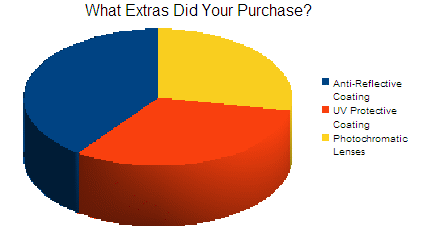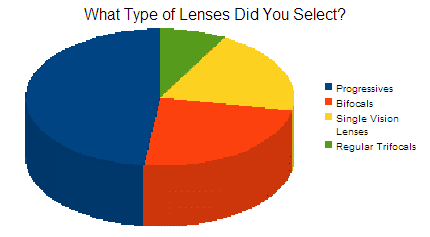Topic: Lenses
"Transitions Optical [in Australia] has distanced itself from a recent consumer promotion that markets the company's lenses as 'free' when bundled with particular products," according to Mivision.com.au.

| « | November 2010 | » | ||||
| S | M | T | W | T | F | S |
| 1 | 2 | 3 | 4 | 5 | 6 | |
| 7 | 8 | 9 | 10 | 11 | 12 | 13 |
| 14 | 15 | 16 | 17 | 18 | 19 | 20 |
| 21 | 22 | 23 | 24 | 25 | 26 | 27 |
| 28 | 29 | 30 | ||||


 Here are some of the results of a Consumer Reports survey:
Here are some of the results of a Consumer Reports survey:








"Schoolgirl Becky Cranmer has baffled doctors after she went blind in just 10 weeks," according to a post on TamesideAdvertiser. (Another version of the story was posted on the website for the DailyMail.) "Six months ago Becky, 11, was looking forward to the summer break before starting at Denton Community College. But during a family holiday in June, her eyesight started to fail – and 10 weeks later she was blind. Becky’s mum took her to an optician, who told them to go to hospital. She spent the next six weeks having tests at the Royal Oldham Hospital and the Royal Manchester Children’s Hospital before doctors diagnosed optic neuritis, the inflammation of the optic nerve." Then her story worsens.
MedicalNewsToday posted the following: "Adults born deaf react more quickly to objects at the edge of their visual field than hearing people, according to groundbreaking new research by the University of Sheffield. The study, which was funded by the Royal National Institute for Deaf People (RNID), has, for the first time ever, seen scientists test how peripheral vision develops in deaf people from childhood to adulthood."
On a post from the same website earlier, there was this: "People who are blind from birth are able to detect tactile information faster than people with normal vision, according to a study in the Oct. 27 issue of The Journal of Neuroscience. The brain requires a fraction of a second to register a sight, sound, or touch. In this study, a group of researchers led by Daniel Goldreich, PhD, of McMaster University explored whether people who have a special reliance on a particular sense - in the way blind people rely on touch - would process that sense faster."
